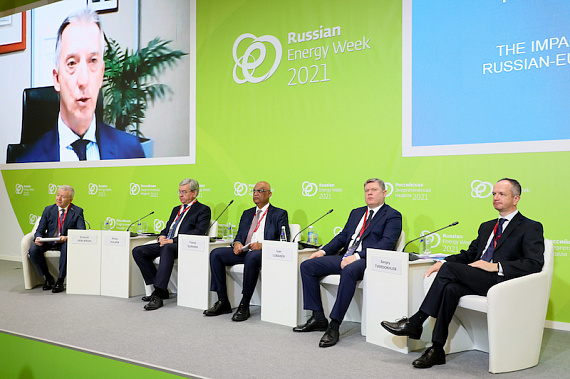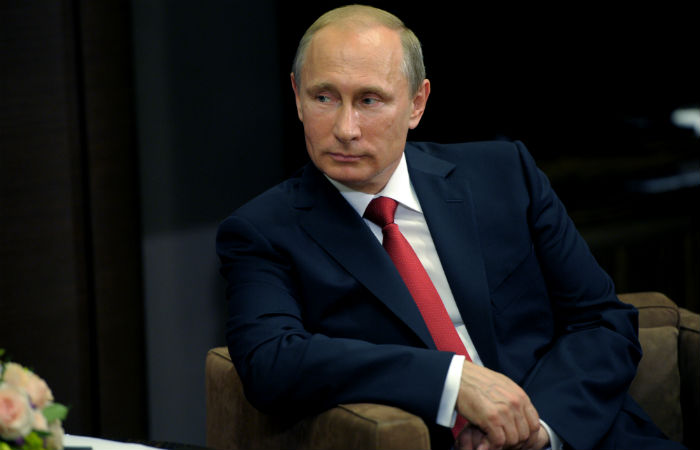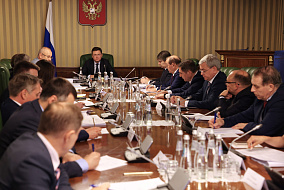The Impact of European Green Focus on the Russian–European Energy Cooperation

CONCLUSIONS
The Russian Federation has a good background for attaining carbon neutrality
“Even today, the fuel and power energy balance in Russia follows the low carbon logic of the future. Over half of the internal consumption in our country is that of gas, which is the most environmentally-friendly type of mineral fuel. In the production breakdown, the share of low carbon sources is over 80% and fully non-carbon sources, such as hydro stations, nuclear stations, sunlight and wind comprise over 40%,” Alexey Kulapin, General Director, Russian Energy Agency (REA) of the Ministry of Energy of Russia.
“Just as other trade partners, such as Korea, China and other countries, Russia has undertaken to reach carbon neutrality by 2050,” Markus Ederer, Ambassador of the European Union to the Russian Federation.
“Of course this means new opportunities for new products. Frankly, we have financed about 60% of the renewable energy volume in the country, that is around 200 billion roubles and we have begun doing it before the public discussion on energy transfer became active,” Alexey Matveev, Deputy Chairman of the Management Board at Gazprombank JSC.
PROBLEMS
Russian exporters do not fully understand the requirements of European partners that are changing due to carbon neutrality trends
“Additional risks for Russian exporters are related to the absence of any carbon footprint tracking system whatsoever, which is why European regulators have grounds to assess the carbon intensity of Russian products using the highest, most rigid standards. These risks may be offset if a national system of carbon regulations harmonized with global standards is developed,” Alexey Kulapin, General Director, Russian Energy Agency (REA) of the Ministry of Energy of Russia.
“What has happened with the European carbon tax just now has brought in a lot of uncertainty for the next 2–3 years, until these points are all reviewed, regulated and some types of agreements are reached. Under these circumstances, it is very difficult to presume and expect that European companies will seriously consider long-terms projects and investments on the Russian market,” Alexey Matveev, Deputy Chairman of the Management Board at Gazprombank JSC.
“The key point that worries businesses is to what extent is the mechanism directed toward countering climate change and reducing carbon intensity and to what extent is it directed toward redistribution of capital,” Sergey Tverdokhleb, Deputy General Director for Special Projects and External Relations, MCC EuroChem.
SOLUTIONS
Mutual development of carbon emission management systems
“Even now we are working on obtaining the status of carbon emission verifier, an authorized agency that confirms the volume of emissions. In the long run, we see the need for accreditation in the European systems of greenhouse gas emission verification and we are open for discussions on this subject with our western partners, including European business associations. This work is important for possible future mutual acceptance of the Russian system in Europe and the European one in Russia,” Alexey Kulapin, General Director, Russian Energy Agency (REA) of the Ministry of Energy of Russia.
“The only purpose for the mechanism of trans-border adjustment is in avoiding carbon leakage. We would not want European companies to flow into those jurisdiction where the legislative measures for regulating carbon footprint are less strict and where they would take their manufacturing and produce their carbon intensive products,” Markus Ederer, Ambassador of the European Union to the Russian Federation.
Development of new carbon recycling and hydrogen fuel technologies
“Let us not forget carbon gas capture and storage opportunities while we wait for those technologies that will help us take advantage of it. Very interesting technologies are coming up, such as, for example, gas mineralization for use in cement production,” Eni Energy Evolution Chief Operating Officer Giuseppe Ricci.
“We were talking about green hydrogen, which is the preferred type of hydrogen in Europe. I think, however, that if we had the right technologies we could use not only gas, but also blue hydrogen. Russia has excellent opportunities for doing this: there is infrastructure, transportation routes and so on. It may become yet another export product for Russia,” Markus Ederer, Ambassador of the European Union to the Russian Federation.
For more details go to the Roscongress Information and Analytical System at roscongress.org





